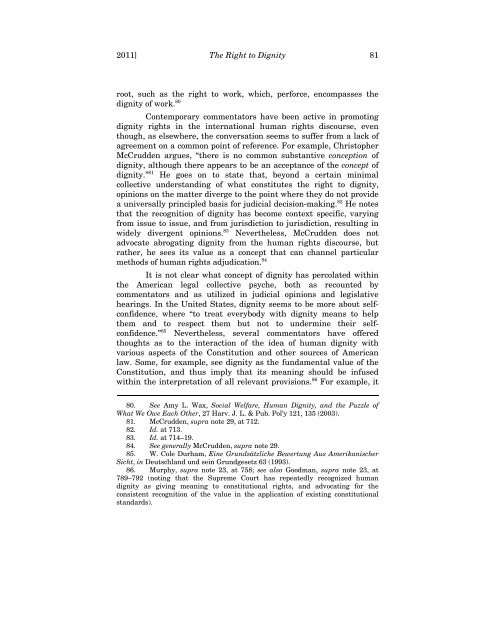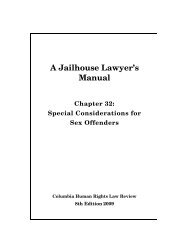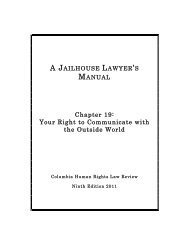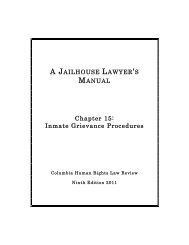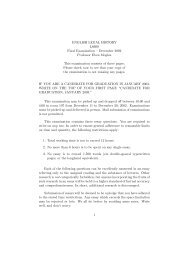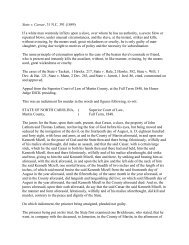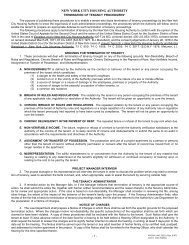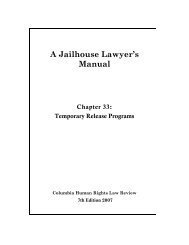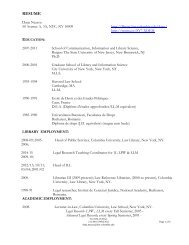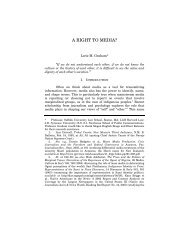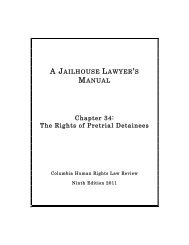The Right to Dignity Rex D. Glensy - Columbia Law School
The Right to Dignity Rex D. Glensy - Columbia Law School
The Right to Dignity Rex D. Glensy - Columbia Law School
Create successful ePaper yourself
Turn your PDF publications into a flip-book with our unique Google optimized e-Paper software.
2011] <strong>The</strong> <strong>Right</strong> <strong>to</strong> <strong>Dignity</strong> 81<br />
root, such as the right <strong>to</strong> work, which, perforce, encompasses the<br />
dignity of work. 80<br />
Contemporary commenta<strong>to</strong>rs have been active in promoting<br />
dignity rights in the international human rights discourse, even<br />
though, as elsewhere, the conversation seems <strong>to</strong> suffer from a lack of<br />
agreement on a common point of reference. For example, Chris<strong>to</strong>pher<br />
McCrudden argues, “there is no common substantive conception of<br />
dignity, although there appears <strong>to</strong> be an acceptance of the concept of<br />
dignity.” 81 He goes on <strong>to</strong> state that, beyond a certain minimal<br />
collective understanding of what constitutes the right <strong>to</strong> dignity,<br />
opinions on the matter diverge <strong>to</strong> the point where they do not provide<br />
a universally principled basis for judicial decisionmaking. 82 He notes<br />
that the recognition of dignity has become context specific, varying<br />
from issue <strong>to</strong> issue, and from jurisdiction <strong>to</strong> jurisdiction, resulting in<br />
widely divergent opinions. 83 Nevertheless, McCrudden does not<br />
advocate abrogating dignity from the human rights discourse, but<br />
rather, he sees its value as a concept that can channel particular<br />
methods of human rights adjudication. 84<br />
It is not clear what concept of dignity has percolated within<br />
the American legal collective psyche, both as recounted by<br />
commenta<strong>to</strong>rs and as utilized in judicial opinions and legislative<br />
hearings. In the United States, dignity seems <strong>to</strong> be more about self<br />
confidence, where “<strong>to</strong> treat everybody with dignity means <strong>to</strong> help<br />
them and <strong>to</strong> respect them but not <strong>to</strong> undermine their self<br />
confidence.” 85 Nevertheless, several commenta<strong>to</strong>rs have offered<br />
thoughts as <strong>to</strong> the interaction of the idea of human dignity with<br />
various aspects of the Constitution and other sources of American<br />
law. Some, for example, see dignity as the fundamental value of the<br />
Constitution, and thus imply that its meaning should be infused<br />
within the interpretation of all relevant provisions. 86 For example, it<br />
80. See Amy L. Wax, Social Welfare, Human <strong>Dignity</strong>, and the Puzzle of<br />
What We Owe Each Other, 27 Harv. J. L. & Pub. Pol’y 121, 135 (2003).<br />
81. McCrudden, supra note 29, at 712.<br />
82. Id. at 713.<br />
83. Id. at 714–19.<br />
84. See generally McCrudden, supra note 29.<br />
85. W. Cole Durham, Eine Grundsätzliche Bewertung Aus Amerikanischer<br />
Sicht, in Deutschland und sein Grundgesetz 63 (1993).<br />
86. Murphy, supra note 23, at 758; see also Goodman, supra note 23, at<br />
789–792 (noting that the Supreme Court has repeatedly recognized human<br />
dignity as giving meaning <strong>to</strong> constitutional rights, and advocating for the<br />
consistent recognition of the value in the application of existing constitutional<br />
standards).


